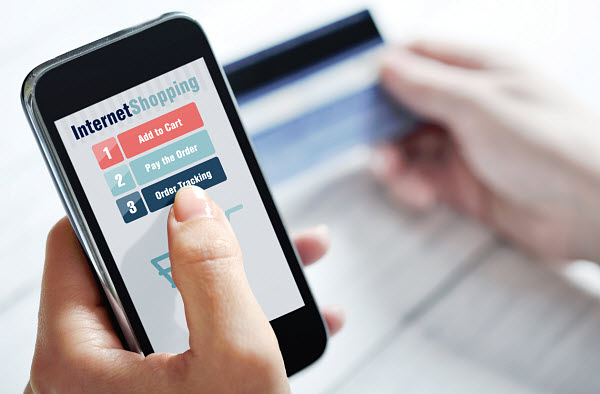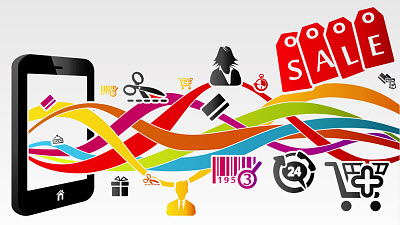Consumers and merchants are beginning to embrace mobile commerce more willingly
Mobile payments in the U.S. are expected to reach new heights in the near future, according to BI Intelligence. Consumers throughout the country have become heavily reliant on their smartphones and tablets and are using these devices to shop online more frequently. As physical stores become more accommodating of mobile consumers, these people are also beginning to use their devices to pay for products from these stores, rather than use traditional forms of currency.
Mobile transaction volume to grow by a CAGR of 153% from 2013 to 2018
BI Intelligence estimates that mobile payment volume will grow at a compound annual growth rate of a staggering 153% from 2013 to 2018. By the end of 2018, total mobile sales are expected to reach $190 billion. The majority of this growth is not expected to be seen until 2016, however, when a favorable balance between consumer acceptance and merchant adoption is expected to be established. Currently, consumers are willing to spend money from their mobile devices, but few merchants have yet to embrace the concept of mobile commerce.
Consumers show favor for the convenience of mobile commerce
 Mobile commerce has been gaining popularity among consumers for some time now. The concept is quite attractive because of its convenient nature, providing consumers a way to shop for and purchase products that they are interested in from a mobile device, no matter where they are in the world. Consumers can often choose where they would like to have the products they have purchase online delivered, or they can opt to pick up these products at a physical store.
Mobile commerce has been gaining popularity among consumers for some time now. The concept is quite attractive because of its convenient nature, providing consumers a way to shop for and purchase products that they are interested in from a mobile device, no matter where they are in the world. Consumers can often choose where they would like to have the products they have purchase online delivered, or they can opt to pick up these products at a physical store.
Merchants may begin to find significant success in mobile commerce beginning in 2016
As consumers become more accepting of mobile commerce, so too are merchants. While many merchants have found it difficult to engage mobile consumers in an effective manner, those highlighting the convenience of mobile payments often find support among particular demographics. Merchants are expected to find more success in their mobile commerce endeavors beginning in 2016, when they begin embracing new, mobile-centric network technologies.
LevelUp begins incorporating iBeacon into its overarching mobile commerce platform
LevelUp, a mobile payments firm that leverages QR codes as a powerful commerce tool, has announced that it has begun integrating Apple’s iBeacon into its platform. The iBeacon is gaining ground as a mobile commerce tool because it serves as a sort of alternative to NFC and similar technologies. The iBeacon utilizes Bluetooth technology to alert consumers of special deals being offered by retailers as soon as they enter a physical store. The service can also be used for a wide range of marketing and commerce initiatives.
LevelUp finds success through its use of Apple’s iBeacon
LevelUp added support for the iBeacon to its platform last month, but has only begun promoting this technology aggressively recently. During the initial testing of the iBeacon, retailers using the technology alongside the LevelUp platform reported a 22% increase in consumer spending. LevelUp notes that the transactions coming from its “lapsed” user base increased by an average of 63%. The introduction of the iBeacon technology into LevelUp’s platform has been well received among those that are using the platform.
The iBeacon could soon become one of the strongest mobile commerce tools available to businesses
 The iBeacon allows retailers to instantaneously engage thousands of consumers in a single store with special offers. The technology can easily notify consumers of when a loyalty reward is available to them and those using the iBeacon can access these rewards quite easily. The technology is meant to add more convenience to mobile commerce while offering those using it a better way to engage consumers in an effective manner. The iBeacon currently serves as one of Apple’s most promising mobile commerce tools, but the technology itself has yet to see extensive use in the retail sector.
The iBeacon allows retailers to instantaneously engage thousands of consumers in a single store with special offers. The technology can easily notify consumers of when a loyalty reward is available to them and those using the iBeacon can access these rewards quite easily. The technology is meant to add more convenience to mobile commerce while offering those using it a better way to engage consumers in an effective manner. The iBeacon currently serves as one of Apple’s most promising mobile commerce tools, but the technology itself has yet to see extensive use in the retail sector.
iBeacon allows businesses to keep track of consumer behavior and adapt accordingly
Beyond providing some convenience to consumers interested in mobile payments, the iBeacon also allows businesses to keep track of information concerning consumer behavior. This information can be used for marketing purposes or help retailers better cater to consumers that are becoming quite reliant on mobile technology.
 Mobile commerce has been gaining popularity among consumers for some time now. The concept is quite attractive because of its convenient nature, providing consumers a way to shop for and purchase products that they are interested in from a mobile device, no matter where they are in the world. Consumers can often choose where they would like to have the products they have purchase online delivered, or they can opt to pick up these products at a physical store.
Mobile commerce has been gaining popularity among consumers for some time now. The concept is quite attractive because of its convenient nature, providing consumers a way to shop for and purchase products that they are interested in from a mobile device, no matter where they are in the world. Consumers can often choose where they would like to have the products they have purchase online delivered, or they can opt to pick up these products at a physical store.
 The iBeacon allows retailers to instantaneously engage thousands of consumers in a single store with special offers. The
The iBeacon allows retailers to instantaneously engage thousands of consumers in a single store with special offers. The 